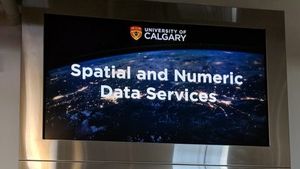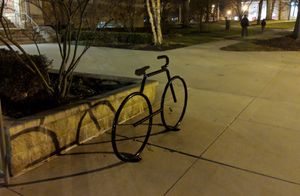An interesting article – Toward a new Alexandria: imagining the future of libraries – by Lisbet Rausing has just appeared in The New Republic. It discusses the continuity of the scholarly record in a richly allusive text. I sensed three strands. First, the scholarly record is evermore diffused through media and formats, embracing source materials, and presents changes of identification and curation. Second, the licensed journal literature is enclosed behind paywalls, and current developments may extend that fate to the book literature. And third, the relevance of the scholarly record to the wider world and to future generations, and the influence of researchers, is diminished by this lack of access. Interestingly, in highlighting the responsibility of libraries, the author notes the necessity of collaborative attention and action. Here is a flavor:
Imagine a new Library of Alexandria. Imagine an archive that contains all the natural and social sciences of the West–our source-critical, referenced, peer-reviewed data–as well as the cultural and literary heritage of the world’s civilizations, and many of the world’s most significant archives and specialist collections. Imagine that this library is electronic and in the public domain: sustainable, stable, linked, and searchable through universal semantic catalogue standards. …
… It is clear that if a new Alexandria is to be built, it needs to be built for the long term, with an unwavering commitment to archival preservation and the public good. A true public good itself, it probably needs to be largely governmentally funded. And, while a global and cooperative venture, it needs to be hosted by one organisation that is reputable, long-standing, nonprofit, and exists in a stable jurisdiction. The Library of Congress, the flagship institution of the world’s only surviving Enlightenment republic, comes to mind. There might be other possibilities, such as the New York Public Library, or the British Library, or a consortium of the world’s leading university libraries–UCLA, Harvard, Cambridge University, and so on. [Toward a new Alexandria: imagining the future of libraries]
She discusses the changing scholarly record and the challenges of assuring continuity of access ..
Scholars rightly argue that we cannot meaningfully analyze our peer-reviewed knowledge without also archiving its primary sources. But today’s knowledge quest is universal: Our primary sources encompass all the knowledge, hopes, and dreams of humanity. Our Alexandria was not burnt, our Byzantium still stands, and our Athenian academies are blossoming. And in addition to the near-infinitude of our scholarly endeavours and their materials, we want to preserve that which we have not yet incorporated into our learned canons: the near-extinct and the barely remembered, the oral traditions and the dying languages, the esoteric and the sacred–the reviled, even–and the persecuted. We want the Nazi state papers and the Lodz ghetto archives, the Soviet encyclopedias and the samizdat literature, the Maimonides commentaries and the Genizah fragments, the Ethiopians’ church songs and their memories of the recent famines….
… You see the problem. What is the library, when the totality of experience approaches that which can be remembered? What is it when we no longer preserve only those fragments that time, fire, and barbarians have left us? When we are no longer are able to safeguard only remnants of our discourses on thought, memory, and images, but the thoughts, memories, and images themselves–complete? What do we do when we have not only the Lives of the Most Excellent Painters, Sculptors, and Architects, but also Vasari’s blog, wiki, twitter, texts, emails, chatroom, Facebook, radio interviews, TV appearances, and electronic notebooks? [Toward a new Alexandria: imagining the future of libraries]
She goes on to talk about publishing and the scholarly record: “their success in locking up and rendering irrelevant the output of academic research has been nothing less than astonishing”. The article talks about open access and copyright. Interestingly, she positions the argument to scholars in terms of their relevance.
If scholars continue to hide away and lock up their knowledge, do they not risk their own irrelevance? An immediately important debate, I think, is to be had over how academics fail to engage with their natural constituency (and former students): journalists, business leaders, lawyers, entrepreneurs, politicians, and civil servants. These people are the ruling classes, if you would like. They are the ones who house and feed professors. Is it really in academics’ long-term interest to not let these well-educated and well-intentioned people as much as glance at, say, the Index of Christian Art? Is it really in their interest not to show the public their scholarly articles and academic monographs? What does this tell the public about who academics think is clubbable? And how will that affect how the public thinks about, say, federal research grants, or top-up fees? [Toward a new Alexandria: imagining the future of libraries]
Lisbet Rausing is a historian of science and philanthropist. Worth reading in full.



